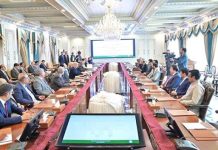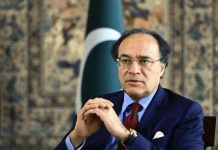Speaking at the event, ILO Country Director Geir T. Tonstol emphasized the urgent need for Pakistan to improve conditions for textile industry workers to retain its Generalised Scheme of Preferences Plus (GSP+) status from the European Union
DNA
ISLAMABAD, AUG 29: The Employers’ Federation of Pakistan (EFP), in collaboration with the International Labour Organization (ILO), convened a high-level consultation today under the BRIDGE project with media leaders at the ILO office in Islamabad. The event focused on the critical role of the media in addressing forced labour and promoting fair recruitment practices in Pakistan.
Speaking at the event, ILO Country Director Geir T. Tonstol emphasized the urgent need for Pakistan to improve conditions for textile industry workers to retain its Generalised Scheme of Preferences Plus (GSP+) status from the European Union. “With Pakistan’s economy heavily reliant on textile exports, it is imperative to enhance working conditions in this sector to maintain our GSP+ status,” he noted, stressing the importance of complying with 27 international standards related to labour, human rights, and environmental protection.
The consultation brought together editors, news directors, and bureau chiefs from 25 major media organizations across the country. Discussions centered on how media coverage can be enhanced to raise awareness, influence public opinion, and drive policy reforms to combat forced labour in the informal sector and ensure ethical recruitment practices.
Dr. Faisal Iqbal, the National Project Coordinator at ILO, highlighted the media’s pivotal role in raising public awareness about forced labour and advocating for fair recruitment practices. “Media can be key influencers in shaping public perceptions about forced labour and labour migration,” Dr. Iqbal stated, emphasizing the media’s responsibility in driving meaningful change.
Syed Nazar Ali Shah, Secretary General of the Employers’ Federation of Pakistan, briefed the media managers on the purpose of the event. He noted that the workshop aimed to foster a deeper understanding among media professionals of the critical issues surrounding forced labour and fair recruitment. He also stressed the importance of collective action in tackling these issues, particularly in the informal sector.
In Pakistan, forced labour remains a significant challenge, particularly in the informal sector. According to various estimates, between 3.4 and 4.3 million individuals are trapped in forced labour situations within the country. The ILO’s latest global estimates indicate that nearly 28 million people worldwide are affected by forced labour, generating illegal profits of approximately $236 billion annually.

















